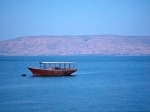Water is a very big deal around here. There is not enough to go around, especially with a growing population here and among our neighbors. There are few natural water sources, and most of those are very seasonal. There is one big lake, the Kinneret (aka The Sea of Galilee), and it is something of a national sport here to track its water level. During dry years the water will recede to levels that are given dramatic codes, ‘red lines’ and ‘black lines’ and ‘super red lines’ and so on. This year was quite wet, with more rain than expected. Kinneret water levels were top-tier news stories during the rainy months, with gleeful reports of surging streams and waterfalls. There are also aquifers located under the hills of central Israel and the West Bank, and these are exploited by the various populations to meet their domestic and agricultural needs. There is also now a growing desalination industry which will reportedly provide enough water for everyone very soon, but at a very high energy cost. Water—there’s just barely enough, so just don’t waste it.
Peace is also a very big deal around here. There’s just not enough of it to go around either, or so it seems. The lack of peace, the lack of a solution to the conflict here between Israel and the Palestinians, gets a lot more attention in the world than the lack of water. A few months ago, I stumbled onto a program that is working with water to achieve peace. It’s worth knowing about.
The Good Water Neighbors project is a project of the Friends of the Earth Middle East. As you can read on its website, this is a project “based on sets of cross-border partnering communities sharing a common water source, promoting environmental awareness & peace building.” The GWN project links communities that share common water sources and engages them in the act of preserving and enhancing that water source, to the benefit of everyone. The communities that are linked are Israeli, Palestinian or Jordanian, and the contacts that are established over water sustainability provide openings for these neighbors to work together to save their common water source rather than kill one another. Kids are a key element in this process, as youth movements and school classes often drive the contacts between communities, creating cross-border contact and working on projects on the ground that help keep the water clean and also help humanize the neighborhood.
A few months ago I was asked by the GWN folks to look at some of their geography education materials to help enhance them with lesson plan ideas with water based activities. I wrote up a few things that came to mind, lessons that might help students understand more clearly what an aquifer is or how ancient water management took place, things like that. I had the luxury of sitting in my apartment and creating lessons, without the challenge of actually teaching them in the field. I hope my ideas will lead to new ideas and new contacts between kids and their parents over the issue of water.
Water is, for some, tied in to the idea of justice. Some get the water, others don’t, and for many, this is just plain unfair. Last night Beth and I marched in the first of this summer’s demonstrations for social justice, renewing the movement that swept through Israel last summer, culminating with half a million people (out of population of seven million) taking to the streets by last August. Last night was just ‘spring training’, in my estimation, with a modest crowd of several hundred gathering and marching through the streets of Jerusalem. Similar modest turnouts were reported in other cities. The mixed-age crowd that I was part of chanted familiar slogans, with calls for social justice and fairness, and for an end to governmental corruption.
Just like with water, this is a country where some people get the money and most don’t, and for many, this is just plain unfair. Israel has a European standard of living and European level of development and growth. The question of why a hard-working young couple can’t expect to ever afford to purchase an apartment in the center of the country is one that people want answered.
Water. Social Justice. Peace. It’s all part of the same story, a basic economic story of limited resources and the need to share them. There’s not enough water…so we’ll protect it together and there will be enough. There’s not enough opportunity…so we’ll work together to enhance opportunity, and give everyone a chance for a better life, (or at least we’ll scream about it and hopefully those with political power will listen). There’s two peoples here and only one piece of land. So we’ll look toward the future, and not toward the past, and see if we can imagine a way to live together, side by side, with our neighbors, sharing our water and our land, and offering each other a chance for a just and dignified life. Nothing in this place is easy. But the effort and the work are worth it. Real and lasting peace in this neighborhood would be incredible. Can we protect and share water? Can we ensure social justice to all members of society? Can we share this land? Just think about it!




